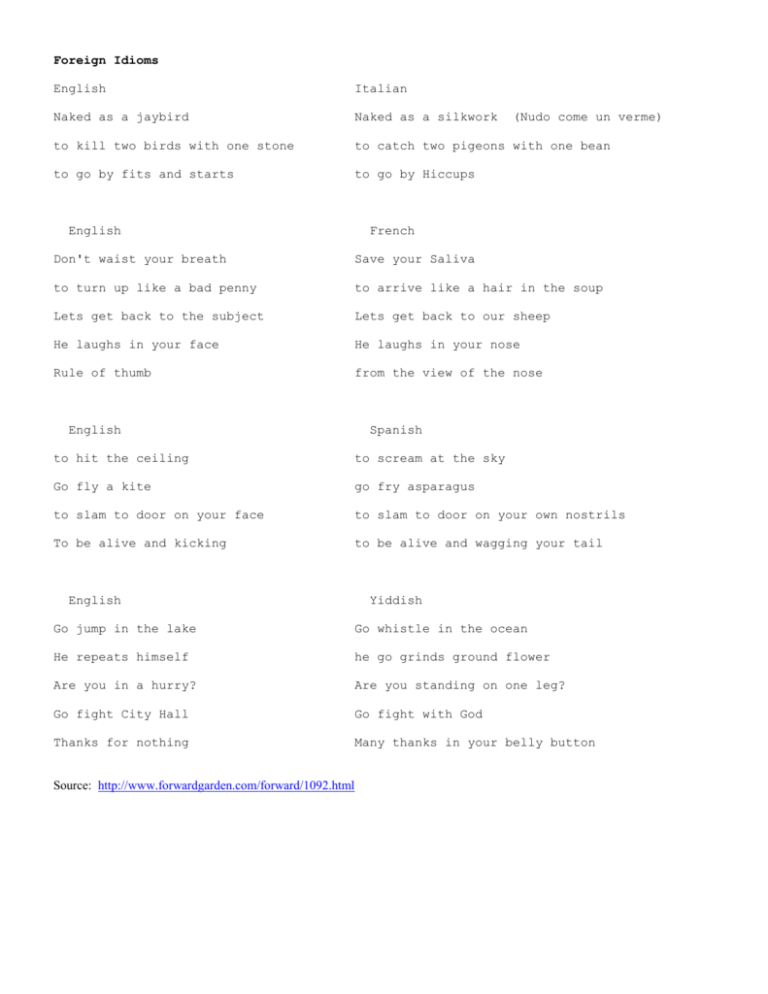Foreign Idioms
advertisement

Foreign Idioms English Italian Naked as a jaybird Naked as a silkwork to kill two birds with one stone to catch two pigeons with one bean to go by fits and starts to go by Hiccups English (Nudo come un verme) French Don't waist your breath Save your Saliva to turn up like a bad penny to arrive like a hair in the soup Lets get back to the subject Lets get back to our sheep He laughs in your face He laughs in your nose Rule of thumb from the view of the nose English Spanish to hit the ceiling to scream at the sky Go fly a kite go fry asparagus to slam to door on your face to slam to door on your own nostrils To be alive and kicking to be alive and wagging your tail English Yiddish Go jump in the lake Go whistle in the ocean He repeats himself he go grinds ground flower Are you in a hurry? Are you standing on one leg? Go fight City Hall Go fight with God Thanks for nothing Many thanks in your belly button Source: http://www.forwardgarden.com/forward/1092.html The New Dictionary of Cultural Literacy, Third Edition. 2002. Idioms It isn’t always the nonnative speaker’s accent (which may be perfect) that enables people to recognize instantly an outsider who is learning their language—it’s the odd mistakes that no native speaker would make. The idiomatic use of words such as to, for, and with varies from language to language. Just as each person has a unique, characteristic signature, each language has unique idioms. In fact, the word idiom comes from the Greek root idio, meaning a unique signature. Thus, each language contains expressions that make no sense when translated literally into another tongue. The humorist Art Buchwald wrote a famous column, often reprinted, in which he translated some of our Thanksgiving (Mercidonnant) terms into literal French, with comic results. If a German or Spaniard or Italian literally translated birthday suit and get down to brass tacks, the terms would make no sense, or the wrong sense. Even a native speaker of English who is not used to hearing literate idioms such as fits and starts, cock-and-bull story, hue and cry, and touch and go will not be able to make sense of them. Our purpose in defining these idioms is to let the cat out of the bag for those who haven’t heard them often enough to catch their meanings. Other idioms are really allusions or foreign-language terms that make no sense unless you know what the allusions or terms mean. Carry coals to Newcastle translates adequately into any language, but it makes no sense to a person who doesn’t know that Newcastle is a coal-mining city. Knowing the literal meaning of idioms won’t enable you to understand them unless you also know what they allude to. Such ignorance is an Achilles’ heel and an albatross around one’s neck. Moreover, just knowing a baker’s dozen of them is not enough; you have to know them en masse. Educators who complain about the illiteracy of the young but pay no attention to teaching idioms are just weeping crocodile tears. We have therefore decided to cut the Gordian knot by systematically defining some of the most widely used idioms in American literate culture. —E.D.H. Source: http://www.bartleby.com/59/4/ 1











